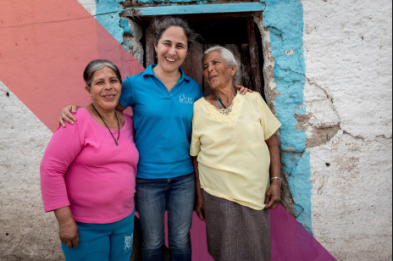
Humanitarian. Educator. Compassionate. Strong. Loyal. Friend.
These are the words used to describe Cecilia Suarez, Head of Office at Catholic Relief Services (Mexico).
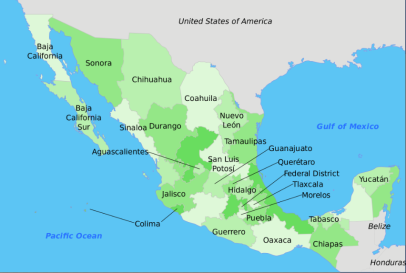
Suarez has been with Catholic Relief Services (CRS) for four years now. This is her first time traveling internationally and her first time visiting Cabrini’s campus.
She grew up in Mexico in a middle-class family with two sisters and a brother. Originally she attended a university to study nutrition. However, a one-week mission trip changed her purpose and lead her to a path she could have never imagined. Fast-forward a number of years and now she heads CRS’s efforts in Mexico.
“I was working with the Jesuits in the Jesuit Migrant Service; then this opportunity opened for the head of office [in Mexico] and I applied and got the job,” Suarez said. “Having the opportunity to grow into something more global was great. CRS has an incredible amount of innovation and is always full of people ready to take action.”
For those that do not know, Catholic Relief Services is an international humanitarian organization that works to assist the poor and vulnerable by striving to break the poverty cycle, fight disease, provide disaster relief and promote justice in over 90 countries.
CRS has been located in Mexico for almost 75 years.
According to Suarez, although Mexico is the 14th largest economy in the world, nearly half of its population lives in poverty.
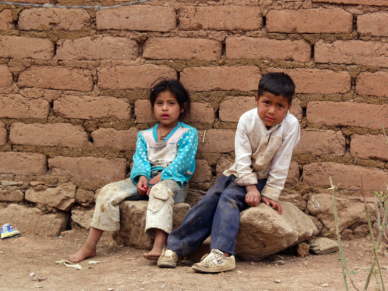
“Everyone is forced to work from 10 years old on,” Suarez said. “They make five to six dollars a day after working 16 hours.”
Increasing poverty, violence, inequality, migration and economic issues make Catholic Relief Services and Suarez’ work crucial within the country.
“We have four priority areas in Mexico: migration, peacebuilding, justice for workers and microfinance programs,” Suarez said.
Her work can most recently be seen “con sus amigas,” four sisters who live in Mexico.
These four women are grandmothers in their 70s, yet they are the primary caretakers for their families.
Currently, the land that they live on is completely eroded and experiencing a drought. This makes it impossible for farmers to produce any source of agriculture.
“The whole family works to grow a type of cactus that you find in the desert. It is very similar to an aloe vera plant. They take the leaves and work them to get fiber. This fiber is used to make brushes. You can also knead sacks for coffee,” Suarez said. “By doing this they make three dollars a day, which is not enough to really survive.”
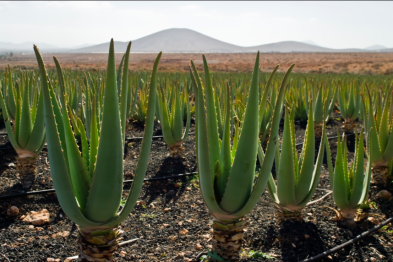
More than three million people are forced to move around Mexico doing temporary farm jobs in huge agro-industries to make enough money to stay alive.
“We decided we needed to find better opportunities for the farmers and their cactuses,” Suarez said.
“Our team is engaging universities to create marketing for their cactuses. They [the farmers] are now seeing an opportunity in their own production. They are really happy and proud to be entrepreneurs.” Suarez said CRS is also helping communities form their own small savings and lending groups. Since they are too poor to be serviced by banks, CRS shows them how they can form their own community banks called savings and internal lending communities.
According to Catholic Relief Services, Savings and Internal Lending Communities (SILCs) are a type of community-based savings groups promoted by Catholic Relief Services (CRS) to strengthen the livelihoods of those they serve.
“This [SILC process] is making a huge difference for them because they are learning that they can have some income, manage that income, make some earning, and then invest in their own business. These small projects are changing the lives of these families. We hope that for the children we will be able to provide other opportunities,” Suarez said.
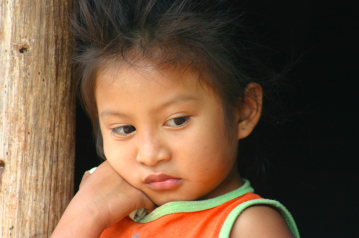
According to Suarez, many children in Mexico are not given an opportunity when it comes to the school system. Teachers in Mexico only teach two to three days a week and the children must travel far to attend school. All children from the ages of six to 12 are grouped in the same classroom, along with children with disabilities.
Because the education system is not up to standard, this forces the students to find better opportunities for themselves and their families, which means going to work.
“These children are being left behind actually,” Suarez said.
“While these people are always positive, [it is] something that really shocked me. When I go to these communities it is the amount of energy that they have. Their willingness to go somewhere to make another option or to have another opportunity. They never sit down. They are always looking for chances to make a better life.”
Catholic Relief Service has over 85 student ambassador programs in the United States. As Suarez completes her tour in the states she urges the CRS student ambassadors to bring awareness to what is happening in Central America.
Suarez spoke to an audience of approximately 60 in the Mansion on Monday, Feb. 20.
“You are part of this door that can be open for the next generation because we need to work for the kids that are going to be the users of our world in a very short period of time,” Suarez said.
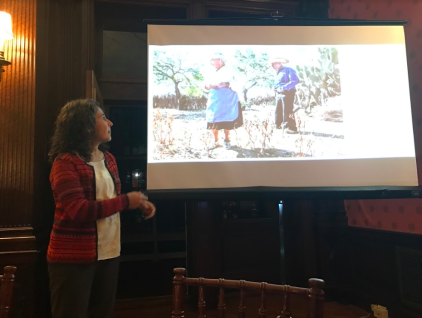
Student ambassadors such as junior Emely Gutierrez are ready to answer the call.
“There are definitely people who are working towards solutions to what is happening in Central and South America, however, it is still important to educate people who are misinformed or unaware and continue to spread awareness,” Gutierrez said.
“Ignorance is probably the most dangerous thing we are facing in the world right now. We need to engage and learn more about what is going on. Go deeper. I think that is our responsibility as lucky people that were able to make it to university,” Suarez said.
https://www.youtube.com/watch?v=gZh-3mmAUvk&feature=youtu.be


